|
|
|
Sort Order |
|
|
|
Items / Page
|
|
|
|
|
|
|
| Srl | Item |
| 1 |
ID:
180076


|
|
|
|
|
| Summary/Abstract |
Long considered objects of pity and welfare assistance, people with disabilities in South Korea and Japan are increasingly treated as rights-bearers. Through activism, litigation, and involvement in international treaty negotiations, Koreans and Japanese with disabilities spurred reforms that created new anti-discrimination protections and obligations to provide reasonable accommodations, access, employment, and social supports. These policy changes also signal a notably more legalistic approach to governance, particularly in South Korea, because they include more detailed rules and formal rights, more enforcement mechanisms like fines, and better recourse to judicial or other dispute resolution bodies.
|
|
|
|
|
|
|
|
|
|
|
|
|
|
|
|
| 2 |
ID:
180073
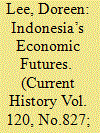

|
|
|
|
|
| Summary/Abstract |
Financial innovations stemming from the digital economy have transformed Indonesians’ everyday lives. “Superapps” offering ride sharing and an array of other services have delivered many conveniences to consumers, while also trapping many in cycles of debt. The state has responded with little more than public awareness campaigns, urging consumers to develop their own digital literacy to avoid scams. Corruption at the state level, meanwhile, remains pervasive, as shown by scandals exposed by the COVID-19 pandemic. Construction of a new capital city will be another test of financial transparency.
|
|
|
|
|
|
|
|
|
|
|
|
|
|
|
|
| 3 |
ID:
180077
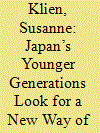

|
|
|
|
|
| Summary/Abstract |
As post-growth Japan hesitates between stagnation and change, its young people are opting out of traditional career paths and seeking lifestyles with greater personal freedom. The COVID-19 pandemic has forced Japanese society to change in some respects, but institutional and corporate leaders remain reluctant to embrace reforms to work and gender norms and in many other areas. Yet social changes are occurring at the grassroots level, as younger Japanese pursuing new opportunities are moving from cities to the countryside, others head overseas in pursuit of more diverse careers and living arrangements, and some among the growing ranks of social introverts turn themselves into successful game developers and writers.
|
|
|
|
|
|
|
|
|
|
|
|
|
|
|
|
| 4 |
ID:
180074
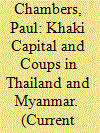

|
|
|
|
|
| Summary/Abstract |
Military-run business activities can turn into an unrestrained form of parasitic capitalism, preying on national economies. The militaries of Thailand and Myanmar have evolved as predatory “khaki capitalist” institutions. Thailand’s military, deriving its legitimacy as guardian of the monarchy, has used that role to justify its accumulation of economic resources. Myanmar’s military, in power for most of the decades since independence, has invoked national security to expand its budget and business interests. Both militaries have repeatedly employed coups to consolidate their economic power, most recently in 2014 in Thailand and 2021 in Myanmar. Fragile democratic governments and international sanctions have proved ineffective in restraining them.
|
|
|
|
|
|
|
|
|
|
|
|
|
|
|
|
| 5 |
ID:
180072
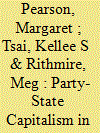

|
|
|
|
|
| Summary/Abstract |
China’s economic model, commonly described as “state capitalist,” is now better characterized as party-state capitalism, in which the political survival of the Communist Party trumps developmental goals. Its tools for managing the economy include not only state ownership and market interventions, but increasing use of party-state power to discipline private capital. China’s entrepreneurs are now expected to adhere to the party line, as are foreign corporations operating in the country. The shift is fueling a backlash from foreign governments that view the fusion of state and private interests in China as a threat to their own national security.
|
|
|
|
|
|
|
|
|
|
|
|
|
|
|
|
| 6 |
ID:
180075
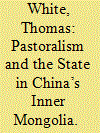

|
|
|
|
|
| Summary/Abstract |
The Chinese government has downgraded use of the Mongol language in schools in the Inner Mongolia Autonomous Region, and is now using its brand of state environmentalism to rein in Mongol pastoralists, blaming them for the degradation of grasslands. By targeting language and land use, the two pillars of Mongol autonomy, the state has shown that it is prepared to override the very limited forms of autonomy still enjoyed by China’s minority nationalities. Mongol leaders are responding by working within the state and its discourses to preserve pastoralism, casting herders not as keepers of a timeless nomadic culture but as partners in preserving biodiversity and stemming desertification.
|
|
|
|
|
|
|
|
|
|
|
|
|
|
|
|
| 7 |
ID:
180078


|
|
|
|
|
| Summary/Abstract |
Hate crimes against Asian Americans have risen sharply during the COVID-19 pandemic. A historical perspective shows that Asians have faced intertwined racial and gender-based biases in the United States since the first anti-immigration backlashes against their presence in the nineteenth century.
|
|
|
|
|
|
|
|
|
|
|
|
|
|
|
|
|
|
|
|
|